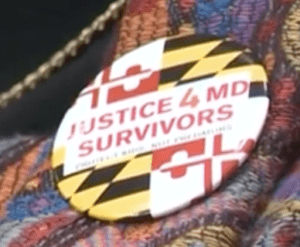
This week, Maryland’s Senate Judicial Proceedings Committee held an historic vote – to finally approve the passage of the Child Victim’s Act of 2023. This bill would allow child victims of sexual abuse, clergy abuse and otherwise, to bring a cause of action against their perpetrators and their institutional accomplices. Most survivors can’t sue past the age of 38 under current Maryland law. And yet, research shows men and women reach their 50s on average before they fully confront childhood abuse. The science of trauma-suppressed memories has been presented to the senate committees through written submissions.
This bill has been years in the making, finding its demise every time in this Committee. When a bill did pass the general assembly in 2017, it was harnessed with last-minute amendments that handcuffed survivors even further. Now, in 2023, hope is on the horizon. Now, under “new management,” the bill passed the JPR by an overwhelming 10-1 vote.
Maryland Supreme Court to Review Latest Child Victims Act
The bill has an interesting provision: it allows for prompt interlocutory review by Maryland’s appellate courts in the event the bill is challenged in an individual suit. In other words, Maryland’s Supreme Court will get an early look at this to see if the bill meets Constitutional muster. This is critical because it is anticipated that the biggest challenge to the bill will be by the Catholic Church, which has historically made that same argument in other states. The question before the court will be whether the elimination of prior statute of limitation and statute of repose protections can be done legislatively. University of Maryland constitutional law professor, Kathleen Hoke, testified in support of the bill. She believes it is constitutional but recognizes there is room for debate.
For a free legal consultation, call,
(888) 585-2188
Support for Maryland Child Victims Act 2023 Grows
Notably, Maryland’s Attorney General has come out in favor of the bill, and he voiced his support over its constitutionality. If challenged in the courts, we anticipate his office will weigh in. That’s huge.
And Maryland’s newly elected Governor, Wes Moore, has also come out strongly in favor of the Maryland Child Victims Act. This is an incredibly positive development.
HB-1 Up for Vote in the House Committee
So, what next? The passage in the Senate was an incremental step. Now, the House version of the bill, HB-1, now goes for a vote. The passage should be smooth sailing here, as the House Committee as always been supportive. Assuming the Senate and House bills match up, so they don’t have to be harmonized in a crossover committee, the bill will proceed to the floor, hopefully with smooth sailing, for the Governor’s signature. When that happens, I hope to be there.
Abuse Survivors Seek Their Day in Court
Kurt Rupprecht, a survivor of clergy abuse from the Eastern Shore, has met regularly with lawmakers during the 2023 session, urging them to make a moral choice and support the bill. He said Friday morning he felt “vindicated” and finally proud of his home state.
Our firm’s client, David Lorenz, Maryland Director of the Survivors Network of those Abused by Priests, or SNAP, was in the Committee room when it happened. “It’s hard to put into words. I just welled up out of nowhere,” he said. “This has always been the obstacle.”
What do survivors and their advocates want? Opportunity. Their opportunity to tell their stories before a jury of their peers. The jury is free to believe the testimony or not. The survivors still have the burden of proof. They still need to muster evidence, testimony, documents. The evidence must be credible. The survivors will be judged by their peers as the 7th Amendment provides. It’s not a free pass. They may win, or they may lose, but they will have the right to be heard. And that’s all they’ve ever asked for.
This week the Maryland Attorney General’s Office must give Baltimore Circuit Court Judge Robert Taylor a redacted version of its 456-page report into the history of sexual abuse within the Catholic Archdiocese of Baltimore, clearing the way for its public release. On February 24, Judge Taylor ordered the report’s release, writing that the “need for disclosure outweighs the need for secrecy.” “Keeping this report from the public is an injustice,” he wrote.
Hopefully, the Maryland General Assembly will hopefully have this report before the bill’s final passage. In face of this powerful condemnation of the Archdiocese of Baltimore, a culmination of a four-year investigation, it will be impossible to deny the need for passage this year. Our clients, all survivors in the state of Maryland, and anyone in the state who cares about this issue deserve accountability and justice.
